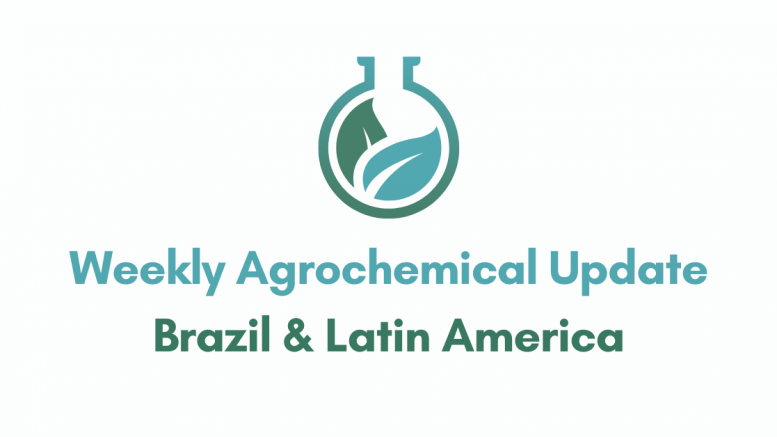Argentina has enough dollars for agribusiness imports
Brazil
Manuel Rocha, member of parliament from Bahia, criticized the bill that prohibits aerial spraying of pesticides in the state. The congressman said that since the approval of the same project in the state of Ceará in 2019 (Law No. 16,820), there has been a loss of around US$ 20.5 million in the economy according to the state government and the State Agriculture and Livestock Federation from Ceará. “Technology is meant to be an ally of agriculture. […] There is very strong supervision and training of pilots”. (Projeto Prisma)
Bioinputs bill framework is approved by the Environment Commission of Federal Senate. The Project seeks to exchange the use of chemical pesticides to bio-
Brazilian farmers’ fertilizer purchasing power was reduced in August. Fertilizer prices increased by more than 10%, while agricultural product prices dropped. Despite the drop the scenario remains favorable to farmers as it allows for a good exchange relationship. (Mosaic Fertilizers)
Roberto Araújo, sustainability leader at CropLife, states that aerial spraying is necessary and an ally of sustainable production. The technique has, among other advantages, application
The use of drones makes sugarcane production more sustainable by reducing the use of herbicides. According to ADAMA’s Product Manager, Vinicius Boleta, “The use of herbicides is a need for the good management of sugarcane fields and, when combined with technology, such as the use of drones, it becomes a more sustainable practice, and can enable savings in up to 85% in the use of herbicides”. (ADAMA)
Fábio Guerra is the new strategic marketing director for Latin America at BASF Agricultural Solutions. (BASF)
Dipagro opened up its first physical store in Primavera do Leste, in the south of Mato Grosso State. The company has Syngenta’s commercial platform – Synap (Syngenta Agriculture Platform). Synap’s general director, Andre Savino, states that this will guarantee farmers greater access to Syngenta’s technologies and services in the region, which has important growth in the country’s agriculture. (Dipagro)

Latin America
Juan José Bahillo, Agriculture Secretary of Argentina, guaranteed that there are enough dollars for the imports necessary for agribusiness. “We have had periods of stress due to not having a big availability. But there has been no shortage of either phytosanitary products or fertilizers.” (Secretary of Agriculture)
Argentina expects a 50% increase in the 2023/24 corn harvest, with estimated production of 60 million tonnes. An investment of US$7.8 billion is expected from farmers during planting, with 16% of the expenditure on fertilizers and 15% on phytosanitary control. (Ministry of Agriculture/Secretary of Agriculture)
Biostimulants maximize crop potential, reduce yield gaps, increase nutritional quality and make crops more resistant to disease and stress, which reduces the need of pesticides. “The demand for organic products, such as biostimulants, has increased significantly due to consumer interest in more natural and environmentally friendly products”, says Eduardo Piper, Plant Nutrition manager. (ALZ – Agro)
BASF launches a new herbicide in Argentina. The product called Voraxor has a new active ingredient, tirexor, for fallow management in soybean, corn, wheat, and barley. (BASF)
Granulated Fertilizer Production Plant (NPK) in Cochabamba, Bolivia, is granted with health registration that guarantees the production of different formulations and slow-release urea. It is ready to operate. (Senasag)
Government of Bolivia begins construction of the Valle Alto Agroinsumos Plant, in the municipality of Arani, with an investment of US$ 6.5 million. (Ministry of Economy)
Nanotica Agro, argentine company located at the Fundación Argentina de Nanotecnología, develops nanoencapsulation to reduce the necessary amount of agrochemicals during application, reduce pollution, and increase crop yields. (Nanotica Agro)

READ MORE:

